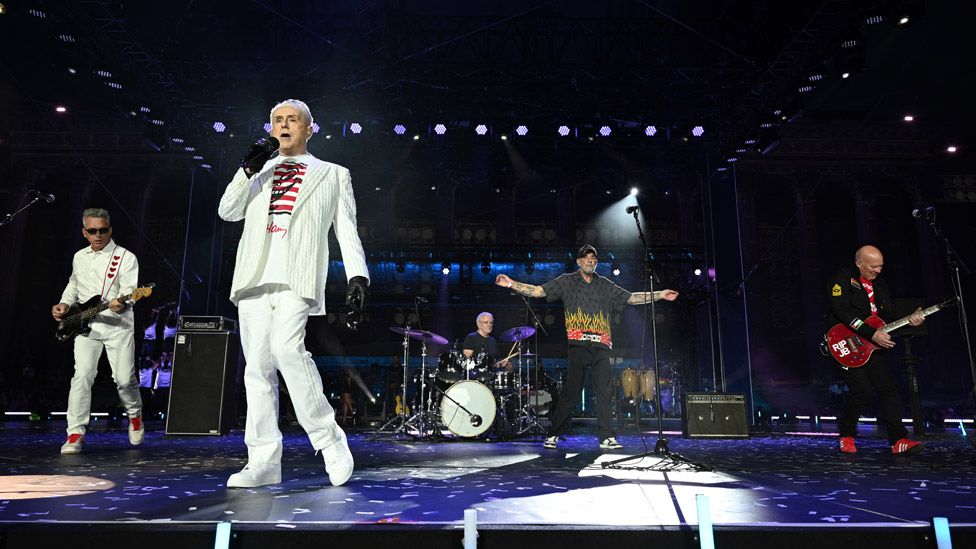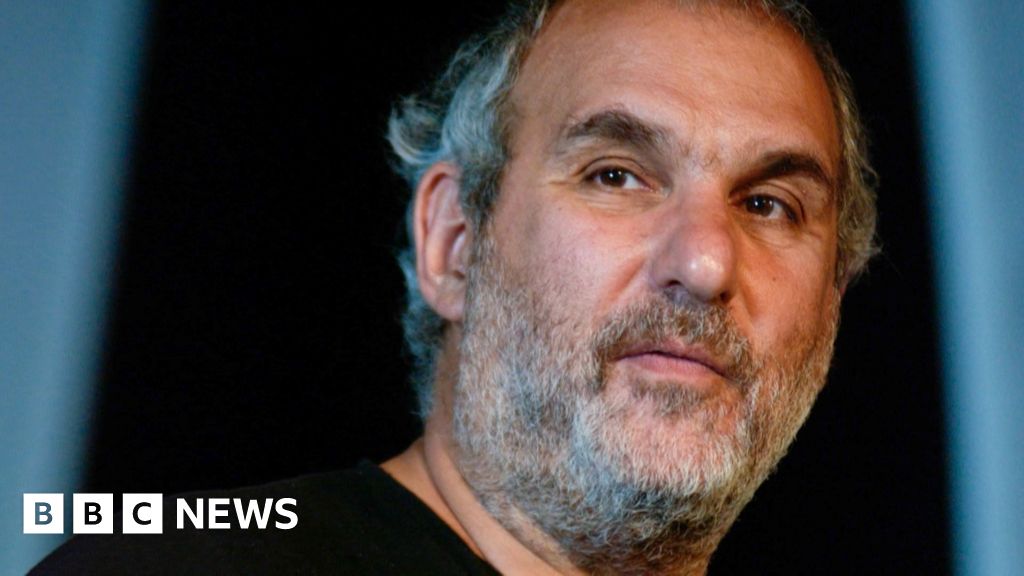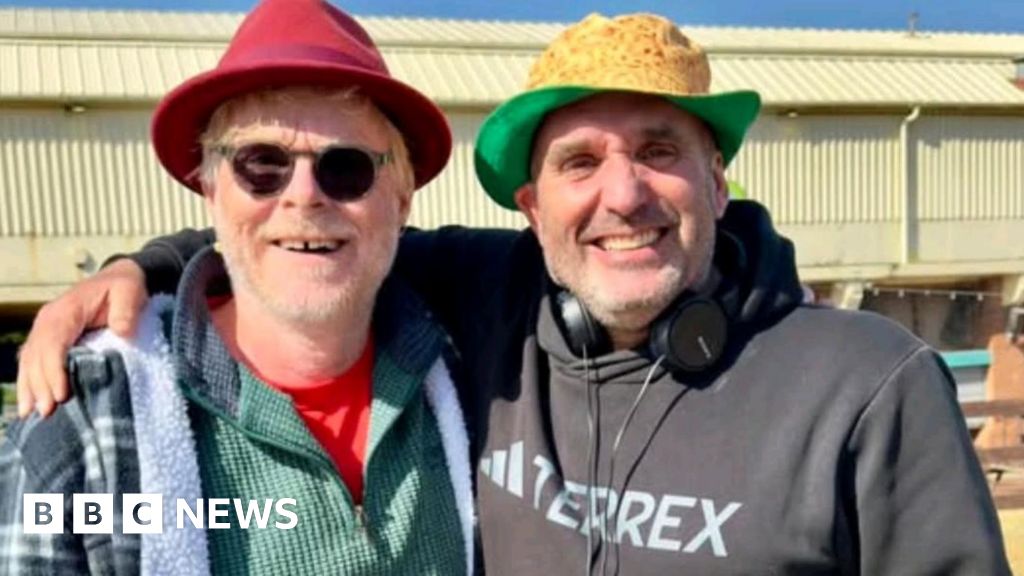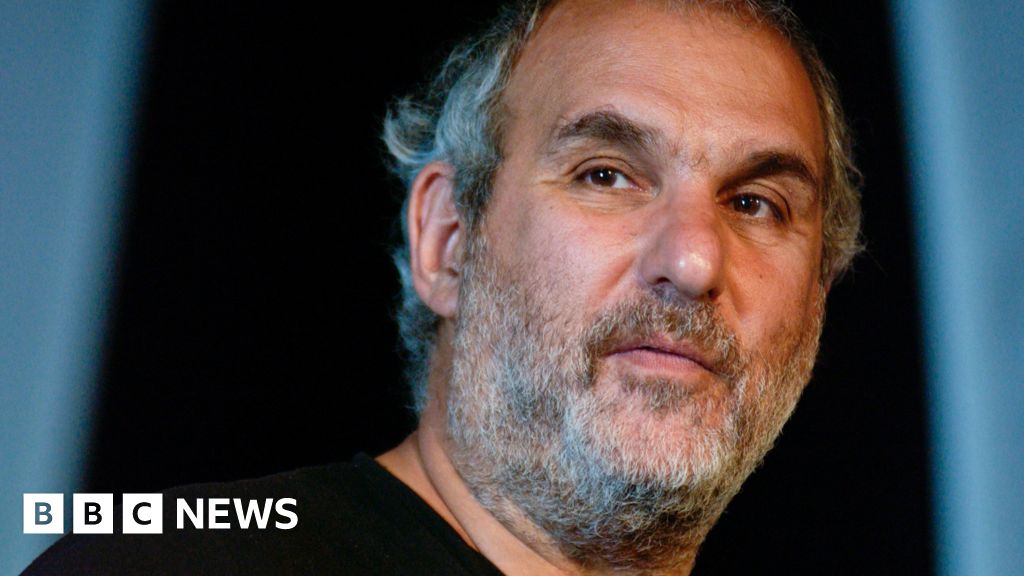ARTICLE AD BOX
 Image source, Getty Images
Image source, Getty Images
The classic line-up had not performed together live since 1987
By Ian Youngs
Entertainment & arts reporter
Frankie Goes To Hollywood have played live for the first time in 36 years - but their long-awaited reunion was brief, lasting for just one song.
The pop band, who were among the biggest stars of the 1980s, buried the hatchet to play for 20,000 people at a concert to mark the Eurovision Song Contest in their home city, Liverpool.
They decided against playing their three UK number ones - Relax, Two Tribes and The Power of Love. Instead, they opted for Welcome To the Pleasuredome, a number two hit in 1985.
Image source, Getty Images
Image caption,Relax was the second biggest-selling song of the 1980s in the UK, behind Band Aid
When its rumbling rhythm and chanted lyrics kicked in, the band succeeded in rolling back the years.
Now with white hair, and wearing a white suit, black glasses and black gloves, frontman Holly Johnson's voice is still unmistakable.
"Bless you," he said to the crowd at the National Lottery's Big Eurovision Welcome concert. "Lovely to see you all."
There was no obvious sign of the acrimony that reportedly saw the group fight backstage before their final gig at Wembley Arena in 1987, and has lingered ever since.
Image source, Getty Images
Image caption,Holly Johnson went solo after the band split
Just six weeks ago, when guitarist Brian "Nasher" Nash and two members of fellow band The Farm launched their guided tours under the banner Liverpool Music Icons Tours, this reconciliation was not on the cards.
Nasher subsequently said he agreed to take part in the reunion so he could spend time in Liverpool with bassist Mark O'Toole and drummer Peter "Ped" Gill - with whom he has remained friendly and who no longer live in the city - and so they could "feel a bit of Scouse love".
While not one of the trio of chart-topping singles that made Frankie such a phenomenon, Welcome To the Pleasuredome is a great song, and is the title track from their remarkable debut album.
Image source, Getty Images
Image caption,The performance will be shown on BBC One on Monday
By the time the tune drew to a close on Sunday, it sounded like the band were just warming up, as were the crowd. The fans were fully expecting them to launch in to Relax or Two Tribes.
But then the group said a brief goodbye and walked off. There were muted cheers, as disbelieving murmurs rose from the audience instead. Even Atomic Kitten had performed two songs.
If this performance was a one-off, it was a memorable if fleeting moment.
It proved the five band members can bear to share a stage - and that they and their songs can still sound compelling and fresh.
Perhaps the 40th anniversary of that debut album next year could present an opportunity to see more of Frankie Goes To Hollywood.
Image source, Stuart C. Wilson
Image caption,Atomic Kitten's Natasha Hamilton and Liz McClarnon performed at the concert
At Sunday's concert, outside Liverpool's St George's Hall, they were on a bill that also included The Lightning Seeds, Jamie Webster, The Real Thing, Ricky Tomlinson and Shirley Ballas.
The show was "Eurovision meets Scousevision", as Lightning Seeds frontman Ian Broudie put it.
Speaking beforehand, Atomic Kitten's Natasha Hamilton said: "We're bringing everyone together. Liverpool is just a melting pot of people and cultures and music. And we get to perform to the crowd today and represent the city, which is amazing."
Image source, Getty Images
Image caption,Jamala performed with members of the United Ukrainian Ballet
As well as the local heroes, Ukraine's Jamala performed her 2016 Eurovision winning song 1944 with the United Ukrainian Ballet. She later joined British singer Birdy to cover The Beatles' All You Need Is Love, accompanied by the Liverpool Signing Choir.
Another Eurovision legend, Conchita Wurst, performed 2014 winning song Rise Like A Phoenix against a light display by a fleet of drones.
Image source, Getty Images
Image caption,Conchita Wurst sang Eurovision anthem Rise Like A Phoenix
RuPaul's Drag Race UK winner The Vivienne performed Abba's Eurovision classic Waterloo. "I'm like the Poundland version of Abba," she joked.
There were also performances from pop stars Alexandra Burke and Zara Larsson.
Image source, Getty Images
Image caption,The show finished with a drone display above St George's Hall
At the start of the show, there were concerns for crowd safety when a number of audience members climbed or were helped out of the area in front of the stage because of overcrowding.
Shortly after it began, co-host Joel Dommett asked the audience to spread out, telling them: "We don't want anyone to get hurt."
Dommett presented the show with AJ Odudu. Highlights will be on BBC One at 18:30 BST on Monday.
The Eurovision semi-finals will take place in Liverpool on Tuesday and Thursday, with the grand final on Saturday.
All the build-up, insights and analysis is explored each week on a BBC podcast called Eurovisioncast.
Eurovisioncast is available on BBC Sounds, or search wherever you get your podcasts from.

 2 years ago
65
2 years ago
65








 English (US) ·
English (US) ·